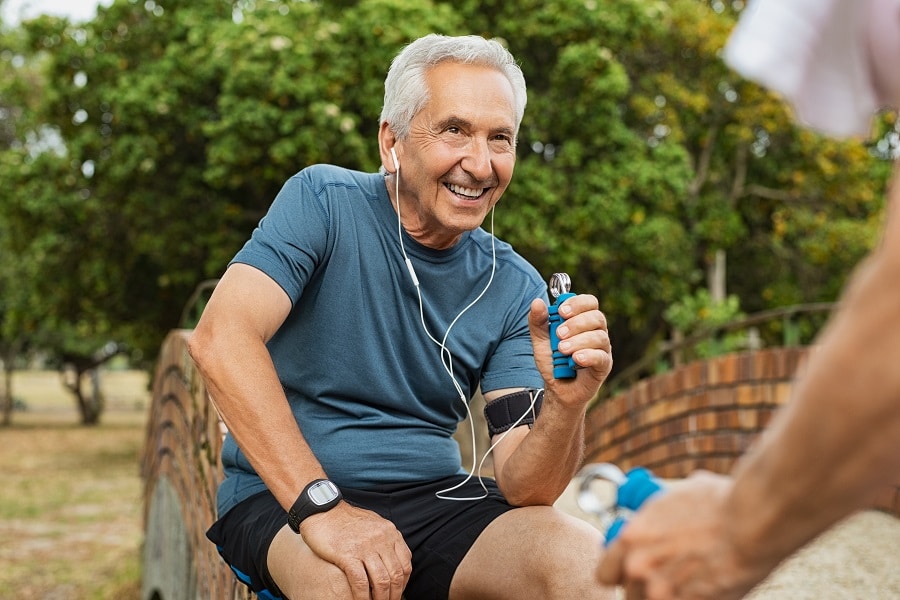Exercise is a cornerstone of health, influencing various aspects of your physiological functioning. Regular engagement in physical activity is often linked to a plethora of benefits, ranging from improved cardiovascular health to enhanced mood. Among these numerous advantages, one that stands out is its link to longevity. This article aims to delve into the association between regular exercise and longevity, backed by scientific research and evidence. So if you have been looking for an excuse to hit the gym, this may be your opportunity!
Contents
- The Science Of Exercise
- Unveiling The Link Between Regular Exercise And Longevity
- Cardiovascular Health
- Metabolic Health
- Mental Health
- Immune Function
- Bone Health
- The Aging Process
- DNA Telomeres
- The Impact Of Sedentary Lifestyle On Longevity
- Experience The Connection Between Regular Exercise And Longevity!
- Related
The Science Of Exercise

Exercise is more than just an activity; it’s a catalyst that stimulates your body at both the cellular and systemic levels. When you exercise, your heart rate increases, your muscles contract, and your body responds by enhancing circulation and metabolic processes. It’s a process that’s as complex as it is beneficial, involving everything from your cardiovascular system to your brain.
Moreover, the impacts of regular exercise extend beyond the immediate physiological responses. Over time, regular physical activity can bring about long-term changes, including increased cardiovascular efficiency, enhanced metabolic function, and improved muscular strength and endurance. The key is consistency, and with it, the benefits of exercise can contribute significantly to longevity.
Unveiling The Link Between Regular Exercise And Longevity
Numerous studies have found a correlation between regular exercise and an increased lifespan. These research efforts have brought forth intriguing results. In the following sections, you’ll get a chance to explore the complex relationship between physical activity and longevity and its effect on different aspects of your health:
Cardiovascular Health

Cardiovascular health is a primary determinant of overall health and longevity, and exercise plays a significant role in it. Regular physical activity strengthens the heart, reduces resting heart rate, and improves blood circulation. Over time, these changes can lower the risk of cardiovascular diseases such as hypertension, coronary artery disease, and stroke.
Furthermore, exercise also helps in managing blood cholesterol levels and promoting better blood vessel health. It encourages the body to maintain an optimal balance of good (HDL) and bad (LDL) cholesterol while preventing plaque buildup in arteries. All these factors combined significantly contribute to increased longevity.
Metabolic Health

Exercise’s role in metabolic health is also noteworthy. Regular physical activity enhances insulin sensitivity and helps in maintaining a healthy body weight, crucial factors in preventing metabolic syndrome and type 2 diabetes. If left unmanaged, these conditions can significantly reduce lifespan and quality of life.
Moreover, exercise assists in maintaining a balanced metabolic rate, which in turn influences energy consumption and fat storage. Regular physical activity can therefore help in managing body weight and preventing obesity – a known risk factor for a number of life-threatening conditions, including heart disease, stroke, and certain cancers.
Mental Health

Exercise’s impact extends beyond physical health; it has a significant influence on mental well-being as well. Regular physical activity stimulates the production of endorphins, the body’s natural mood elevators, which can help reduce stress and anxiety and enhance mood. These effects can be especially beneficial for people who are dealing with depression or other mental health issues.
Moreover, research has indicated that regular exercise can slow cognitive decline and may even lower the risk of developing dementia and Alzheimer’s disease. By fostering brain health, exercise can contribute to a longer, healthier life, one filled with mental clarity and vitality.
Immune Function

The immune system, your body’s defense mechanism, is crucial for longevity, and regular exercise aids in maintaining its optimal function. Exercise promotes good circulation, allowing immune cells to move freely and perform their surveillance functions efficiently, enhancing the body’s ability to fight diseases. Regular physical activity can also help reduce inflammation, which is believed to have an essential role in the progress of many chronic illnesses.
Furthermore, regular physical activity has been shown to slow down changes that happen to the immune system with age, thus reducing the risk of infections and illnesses. By bolstering immune function and resilience, exercise can improve the body’s ability to fight off illness and keep it healthy.
Bone Health

Bone health is another aspect where exercise shines. Weight-bearing and resistance exercises stimulate bone formation and slow down bone loss, crucial factors in preventing osteoporosis and fractures that can compromise one’s quality of life. And in some cases, physical activity can help increase bone mineral density, making bones stronger.
Additionally, maintaining bone health through exercise is essential for maintaining mobility and independence as you age, both crucial factors for a longer, healthier life. By promoting bone health, regular exercise ensures a strong foundation for your body, contributing significantly to longevity.
The Aging Process

Regular exercise even seems to slow down the aging process at a cellular level. It promotes the production of antioxidants in the body, which combat oxidative stress – a key player in the aging process. By reducing oxidative stress, exercise can help slow down aging and increase lifespan.
Moreover, exercise aids in preserving muscle mass and strength, which tend to decline with age. This can help maintain functionality and independence in older age, contributing to healthier aging and, consequently, a longer life.
DNA Telomeres

Recently, intriguing findings have linked exercise with telomere length. Telomeres are the end parts of your chromosomes that shorten as cells divide, acting as a biological clock of aging. Studies suggest regular physical activity is associated with longer telomeres, indicating slower cellular aging.
This fascinating research is still in its early stages, but it offers yet another perspective on how regular exercise might contribute to increased longevity. By potentially influencing the very mechanics of your cellular aging, exercise stands as a formidable tool in your quest for a long healthy life.
The Impact Of Sedentary Lifestyle On Longevity

As you delve into the benefits of exercise, it’s worth noting the flip side – the detrimental effects of a sedentary lifestyle on longevity. Lack of physical activity is associated with a higher risk of numerous chronic diseases, including heart disease, diabetes, and cancer, which can significantly shorten lifespan.
Moreover, a sedentary lifestyle can lead to obesity, deteriorating mental health, and reduced quality of life. In stark contrast to the benefits of exercise, the sedentary lifestyle serves as a stark reminder of the importance of regular physical activity in achieving longevity.
Experience The Connection Between Regular Exercise And Longevity!
From enhancing cardiovascular health to impacting your cells’ aging process, regular exercise emerges as a crucial factor in promoting longevity. The benefits are manifold and affect nearly every aspect of your health. It not only helps you live longer but also enables you to enjoy those extra years in good health. As you strive for longer, healthier lives, let’s remember to lace up those sneakers, hit the pavement, and remember the link between regular exercise and longevity!


